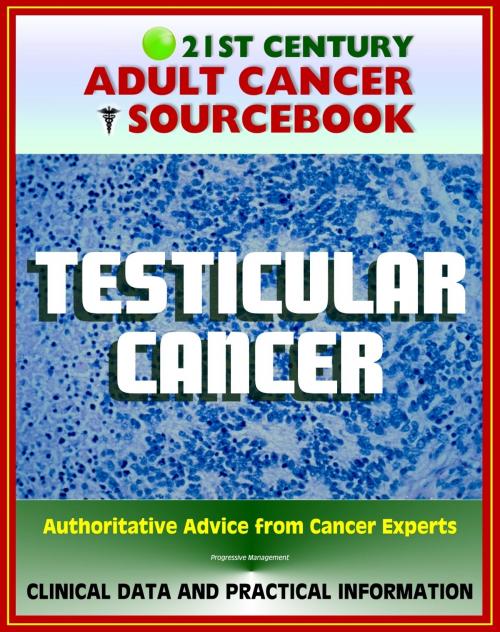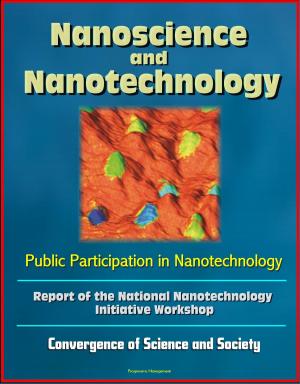21st Century Adult Cancer Sourcebook: Testicular Cancer (Cancer of the Testicles) - Clinical Data for Patients, Families, and Physicians
Nonfiction, Health & Well Being, Health, Ailments & Diseases, Cancer| Author: | Progressive Management | ISBN: | 9781465827173 |
| Publisher: | Progressive Management | Publication: | October 28, 2011 |
| Imprint: | Smashwords Edition | Language: | English |
| Author: | Progressive Management |
| ISBN: | 9781465827173 |
| Publisher: | Progressive Management |
| Publication: | October 28, 2011 |
| Imprint: | Smashwords Edition |
| Language: | English |
Authoritative information and practical advice from the nation's cancer experts about testicular cancer includes official medical data on signs, symptoms, early detection, diagnostic testing, risk factors and prevention, treatment options, surgery, radiation, drugs, chemotherapy, staging, biology, prognosis, and survival, with a complete glossary of technical medical terms and current references.
Starting with the basics, and advancing to detailed patient-oriented and physician-quality information, this comprehensive in-depth compilation gives empowered patients, families, caregivers, nurses, and physicians the knowledge they need to understand the diagnosis and treatment of testicular cancer.
Comprehensive data on clinical trials is included - with information on intervention, sponsor, gender, age group, trial phase, number of enrolled patients, funding source, study type, study design, NCT identification number and other IDs, first received date, start date, completion date, primary completion date, last updated date, last verified date, associated acronym, and outcome measures.
Testicular cancer is the most common cancer in men 20 to 35 years old. Health history can affect the risk of developing testicular cancer. Risk factors for testicular cancer include:
* Having had an undescended testicle.
* Having had abnormal development of the testicles.
* Having a personal history of testicular cancer.
* Having a family history of testicular cancer (especially in a father or brother).
* Being white.
Possible signs of testicular cancer include swelling or discomfort in the scrotum.
These and other symptoms may be caused by testicular cancer. Other conditions may cause the same symptoms. A doctor should be consulted if any of the following problems occur:
* A painless lump or swelling in either testicle.
* A change in how the testicle feels.
* A dull ache in the lower abdomen or the groin.
* A sudden build-up of fluid in the scrotum.
* Pain or discomfort in a testicle or in the scrotum.
Extensive supplements, with chapters gathered from our Cancer Toolkit series and other reports, cover a broad range of cancer topics useful to cancer patients. This edition includes our exclusive Guide to Leading Medical Websites with updated links to 81 of the best sites for medical information, which let you quickly check for updates from the government and the best commercial portals, news sites, reference/textbook/non-commercial portals, and health organizations. Supplemental coverage includes:
Levels of Evidence for Cancer Treatment Studies
Glossary of Clinical Trial Terms
Clinical Trials Background Information and In-Depth Program
Clinical Trials at NIH
How To Find A Cancer Treatment Trial: A Ten-Step Guide
Taking Part in Cancer Treatment Research Studies
Access to Investigational Drugs
Clinical Trials Conducted by the National Cancer Institute's Center for Cancer Research at the National Institutes of Health Clinical Center
Taking Time: Support for People with Cancer
Facing Forward - Life After Cancer Treatment
Chemotherapy and You
Authoritative information and practical advice from the nation's cancer experts about testicular cancer includes official medical data on signs, symptoms, early detection, diagnostic testing, risk factors and prevention, treatment options, surgery, radiation, drugs, chemotherapy, staging, biology, prognosis, and survival, with a complete glossary of technical medical terms and current references.
Starting with the basics, and advancing to detailed patient-oriented and physician-quality information, this comprehensive in-depth compilation gives empowered patients, families, caregivers, nurses, and physicians the knowledge they need to understand the diagnosis and treatment of testicular cancer.
Comprehensive data on clinical trials is included - with information on intervention, sponsor, gender, age group, trial phase, number of enrolled patients, funding source, study type, study design, NCT identification number and other IDs, first received date, start date, completion date, primary completion date, last updated date, last verified date, associated acronym, and outcome measures.
Testicular cancer is the most common cancer in men 20 to 35 years old. Health history can affect the risk of developing testicular cancer. Risk factors for testicular cancer include:
* Having had an undescended testicle.
* Having had abnormal development of the testicles.
* Having a personal history of testicular cancer.
* Having a family history of testicular cancer (especially in a father or brother).
* Being white.
Possible signs of testicular cancer include swelling or discomfort in the scrotum.
These and other symptoms may be caused by testicular cancer. Other conditions may cause the same symptoms. A doctor should be consulted if any of the following problems occur:
* A painless lump or swelling in either testicle.
* A change in how the testicle feels.
* A dull ache in the lower abdomen or the groin.
* A sudden build-up of fluid in the scrotum.
* Pain or discomfort in a testicle or in the scrotum.
Extensive supplements, with chapters gathered from our Cancer Toolkit series and other reports, cover a broad range of cancer topics useful to cancer patients. This edition includes our exclusive Guide to Leading Medical Websites with updated links to 81 of the best sites for medical information, which let you quickly check for updates from the government and the best commercial portals, news sites, reference/textbook/non-commercial portals, and health organizations. Supplemental coverage includes:
Levels of Evidence for Cancer Treatment Studies
Glossary of Clinical Trial Terms
Clinical Trials Background Information and In-Depth Program
Clinical Trials at NIH
How To Find A Cancer Treatment Trial: A Ten-Step Guide
Taking Part in Cancer Treatment Research Studies
Access to Investigational Drugs
Clinical Trials Conducted by the National Cancer Institute's Center for Cancer Research at the National Institutes of Health Clinical Center
Taking Time: Support for People with Cancer
Facing Forward - Life After Cancer Treatment
Chemotherapy and You















